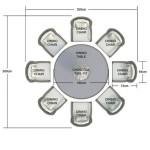A Comprehensive Guide to the 20 Round Table Conference
The 20 Round Table Conference, held in 1930, was a pivotal event in the history of India's freedom struggle. It brought together representatives from various Indian political groups and the British government to discuss constitutional reforms and India's future as a self-governing nation. This comprehensive guide provides an in-depth understanding of the conference's key aspects, significance, and impact on India's path towards independence.
Background and Context
The Round Table Conference was a series of three conferences held in London between 1930 and 1932. The first conference was attended by representatives from all major Indian political parties, including the Indian National Congress, the Muslim League, and the Hindu Mahasabha. The British government was represented by a delegation led by Prime Minister Ramsay MacDonald.
Objectives and Agenda
The primary objective of the Round Table Conference was to discuss constitutional reforms and find a mutually acceptable solution to India's political future. The conference agenda included discussions on federalism, provincial autonomy, and the creation of a responsible government in India. However, the issue of complete independence was not explicitly on the table.
Key Issues and Debates
The conference was marked by several key issues and debates. One of the central issues was the status of the Indian National Congress. The Congress, under the leadership of Mahatma Gandhi, demanded complete independence for India, a position that was opposed by the British government and some Indian delegates.
Another important issue was the question of communal representation. The Muslim League, led by Muhammad Ali Jinnah, insisted on separate electorates for Muslims to protect their political interests. This demand was opposed by the Congress and other delegates who advocated for a joint electorate based on universal adult suffrage.
Outcomes and Impact
Despite intense discussions and negotiations, the first Round Table Conference failed to reach a consensus on several key issues. The conference adjourned without any concrete agreement, and the differences between the Indian delegates and the British government remained unresolved.
The second and third conferences, held in 1931 and 1932, respectively, also failed to produce significant progress. The British government's unwillingness to grant complete independence and the unresolved issue of communal representation hindered the conference from achieving its intended goals.
Significance and Legacy
Although the 20 Round Table Conference did not result in immediate constitutional reforms or independence for India, it played a significant role in shaping the future of the Indian independence movement. The conference brought together diverse Indian leaders and provided a platform for them to articulate their demands and concerns.
The conference also highlighted the deep divisions and complexities within the Indian nationalist movement, particularly the differences between the Congress and the Muslim League. The failure of the conference to resolve these divisions and achieve a consensus on India's future contributed to the growing tensions and conflicts that would eventually lead to the partition of India in 1947.

Round Table Conferences First Second Third

The First Round Table Conference Ended On January 19 1931 This Day In History

Conference Table Dimensions Size Guide And Seating Chart

Conference Table Dimensions Size Guide And Seating Chart

Round Table Conference Geographies

Conference Table Dimensions Size Guide And Seating Chart

Round Table Conference History Pak

36rd Conference Table Gc M Blk 15 Bizchair

Round Table Conferences Wikipedia

Conference Table Dimensions Size Guide And Seating Chart
Related Posts








